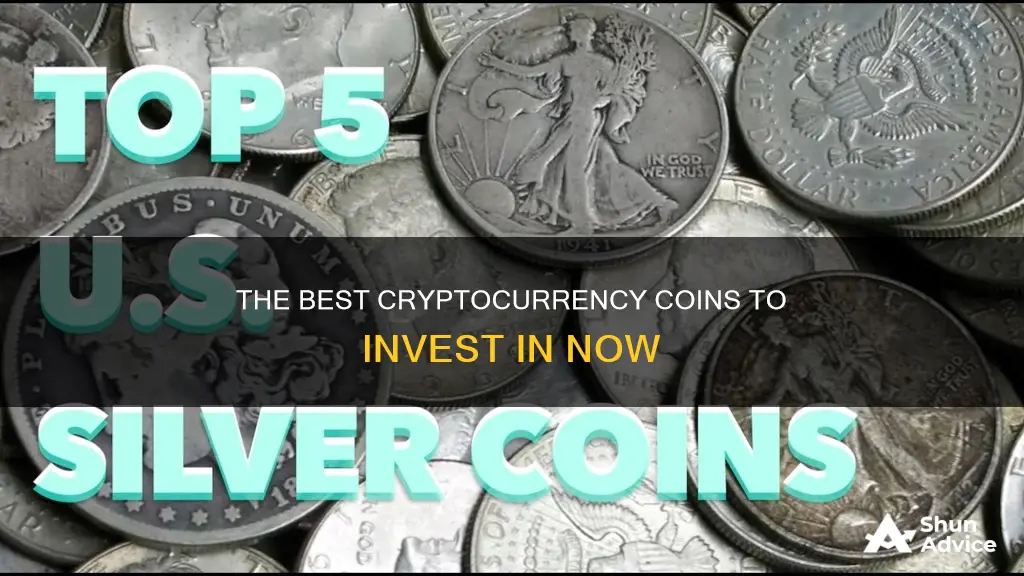
With the crypto market's extreme volatility and unpredictability, it can be challenging for investors to decide where to put their money. Here are some of the top cryptocurrencies to consider:
- Bitcoin (BTC) is the original cryptocurrency and the most popular and valuable. It runs on a blockchain and is kept secure through a proof-of-work consensus.
- Ethereum (ETH) is the largest player in the DeFi and dApp space and has a proof-of-stake mechanism, making it more efficient and greener than Bitcoin.
- Binance Coin (BNB) powers the BNB Chain ecosystem, which boasts high speed and low cost. It also provides benefits on the Binance exchange platform.
- Solana (SOL) is one of the fastest blockchains on the market, with low transaction fees. However, it has experienced several network outages.
- XRP is a global payments network designed as an alternative to the SWIFT system used by banks and financial institutions. It allows for faster and cheaper international settlements.
- Dogecoin (DOGE) is one of the most popular tokens, endorsed by several figures in the crypto community and celebrities like Elon Musk. However, it has no practical application and has unlimited supply, leading to inflation.
- Cardano (ADA) is a decentralized blockchain with smart contracts that ensure adaptability, scalability, and security. It is more energy-efficient than Ethereum, resulting in lower transaction costs.
- Polkadot (DOT) is a Layer-0 protocol that connects and secures multiple blockchains, enabling the transfer of various digital assets. It has high interoperability but faces competition from similar platforms.
- Shiba Inu (SHIB) is another meme token similar to Dogecoin, with a dog face as its mascot. It has gained traction on social media and may be included on trading platforms like Robinhood. However, it has extreme volatility and limited real-world utility.
| Characteristics | Values |
|---|---|
| Most popular cryptocurrency | Bitcoin |
| Largest player in the DeFi and dApp space | Ethereum |
| Fastest blockchain on the market | Solana |
| Native crypto of the Binance exchange | BNB |
| Native cryptocurrency designed for the Ripple network | XRP |
| Memecoin with a passionate and active community | Dogecoin |
| Decentralized blockchain project designed as an open-source platform | Cardano |
| Layer-0 protocol for connecting and securing several blockchains | Polkadot |
| Meme token with a dog face as a mascot | Shiba |
What You'll Learn
- Bitcoin: the original cryptocurrency, with a decentralised, blockchain-based system
- Ethereum: the first to introduce smart contract functionality, and a platform for decentralised applications and finance
- Binance Coin: the native crypto of one of the world's largest cryptocurrency exchanges
- Solana: a decentralised blockchain platform with one of the fastest transaction speeds on the market
- Dogecoin: a token that began as a joke on Bitcoin, but has since become a legitimate investment

Bitcoin: the original cryptocurrency, with a decentralised, blockchain-based system
Bitcoin is the original cryptocurrency, created in 2009 by Satoshi Nakamoto. It runs on a blockchain, a decentralised, distributed ledger that logs transactions across a network of thousands of computers.
Bitcoin's blockchain is made up of blocks, which contain transaction data, timestamps, and a cryptographic hash of the previous block in the chain. This hash acts as a unique fingerprint, ensuring the integrity of the data in the block. Once a block is full, it is closed and added to the chain, with mining computers solving a cryptographic puzzle to validate the block and receive a reward. This process is known as proof of work and is used to secure the network against fraudsters.
The decentralised nature of Bitcoin's blockchain means that no single person or group has control. Instead, all users collectively retain control, with each node in the network having a copy of the blockchain. This makes it nearly impossible for a hacker to alter the data, as they would need to change every copy of the blockchain across the network.
Bitcoin's blockchain is also transparent, allowing anyone to view transactions live and track bitcoins as they move through the network. This transparency, combined with decentralisation, makes Bitcoin secure and free from manipulation or control by any central authority.
The use of blockchain technology has revolutionised the way data is stored and transferred, with potential applications across various industries, including finance, supply chain management, and voting systems.
Dash Coin Investment Guide for Indians
You may want to see also

Ethereum: the first to introduce smart contract functionality, and a platform for decentralised applications and finance
Ethereum is a decentralised software platform that was the first to introduce smart contracts, enabling decentralised applications (dApps) to be built and run without any downtime, fraud, control, or interference from a third party.
Smart contracts are simply programs that run on the Ethereum blockchain. They are a type of Ethereum account, with a balance, and can be the target of transactions. However, they are not controlled by a user; instead, they are deployed to the network and run as programmed.
Smart contracts are self-executing pieces of code that execute when the preset conditions are met. For example, a smart contract can be programmed to sell a house when an amount greater than a particular number is offered for the property. It will then transfer the rights and money to the seller, eliminating the need for a broker.
Smart contracts are stored on the blockchain, which means they are immutable and globally distributed. Being immutable means that once the smart contract is deployed, no one can tamper with it. Global distributability means that everyone on the blockchain network validates the contract's output, making tampering nearly impossible.
Smart contracts can be used to create and distribute unique digital assets, an automatic open currency exchange, decentralised gaming, and an insurance policy that pays out automatically.
Ethereum has also experienced tremendous growth. From April 2016 to July 2024, its price went from about $11 to around $3,347, increasing by 30,330%.
A Beginner's Guide to Investing via Coinbase
You may want to see also

Binance Coin: the native crypto of one of the world's largest cryptocurrency exchanges
Binance Coin (BNB) is a form of cryptocurrency that you can use to trade and pay fees on Binance, one of the largest crypto exchanges in the world. Since its launch in 2017, Binance Coin has expanded beyond its initial use case of facilitating trades on the Binance exchange platform. Today, it can be used for trading, payment processing, or even booking travel arrangements. It can also be traded or exchanged for other forms of cryptocurrency, such as Ethereum or Bitcoin.
History of Binance Coin
Binance Coin was initially launched in July 2017 as a utility token on the Ethereum network, under the name Binance Coin. The token was created to provide users with a means of paying fees on the Binance platform. Over time, the token's use cases expanded, and it became a popular medium of exchange within the crypto community. In September 2020, the Binance Smart Chain was released, and the token was migrated to this new blockchain. This migration was done to address concerns about the centralization of the token and to improve the overall security of the network. In February 2022, the token's name was changed to Build'N'Build (BNB), and the blockchain was renamed the BNB Chain.
Benefits of Binance Coin
One of the main benefits of Binance Coin is its applicability within the Binance ecosystem. For users of the Binance exchange, Binance Coin offers discounted trading fees, making it a cost-effective option for those looking to minimize their transaction costs. Additionally, Binance Coin can also be staked on the platform, allowing users to earn rewards and further reduce their fees.
Another advantage of Binance Coin is its growing list of use cases beyond the Binance platform. Binance Coin can now be used for payment processing, booking travel arrangements, and even participating in decentralized finance (DeFi) applications. This increasing adoption of Binance Coin as a means of exchange adds to its value and makes it a more attractive investment option for those looking to enter the crypto market.
Risks and Considerations
While Binance Coin has seen significant growth and expansion since its launch, it is important to consider the risks associated with investing in any cryptocurrency. The crypto market is highly volatile, and the value of Binance Coin can fluctuate significantly. Additionally, Binance, as a company, has faced regulatory challenges and legal issues in various countries, which have impacted the price of Binance Coin. It is crucial for investors to carefully research these factors and understand the potential impact on their investments.
Investing in Binance Coin
When considering investing in Binance Coin, it is essential to do your due diligence and carefully assess your risk tolerance and investment goals. Cryptocurrencies, in general, are a high-risk investment option, and Binance Coin is no exception. Ensure that you have a comprehensive understanding of the market, the specific risks associated with Binance Coin, and the potential impact on your financial portfolio.
To invest in Binance Coin, you will need to follow the standard process of purchasing any cryptocurrency. This typically involves signing up on a crypto exchange, such as Binance or Coinbase, and funding your account. Once you have deposited funds into your account, you can then use those funds to purchase Binance Coin. It is important to note that the availability of Binance Coin and the specific process of purchasing it may vary depending on your location and the exchange you choose.
In conclusion, Binance Coin, the native cryptocurrency of the Binance exchange, offers a wide range of use cases and has seen significant growth since its launch. However, as with any investment, it is crucial to carefully consider the risks and perform thorough research before making any decisions.
A Guide to Investing in Litecoin Cryptocurrency
You may want to see also

Solana: a decentralised blockchain platform with one of the fastest transaction speeds on the market
Solana is a decentralised blockchain platform that facilitates the creation of decentralised applications (DApps), with a particular focus on decentralised finance (DeFi) solutions. It is one of the fastest blockchain platforms on the market, capable of processing up to 50,000-65,000 transactions per second. This is achieved through a combination of proof-of-stake consensus and a unique proof-of-history mechanism, which timestamps each transaction, allowing nodes to process transactions without communicating with each other.
Solana was launched in March 2020 by the Solana Foundation, based in Geneva, Switzerland. Its native cryptocurrency, SOL, is used to pay for transactions and can also be staked by those who want to help secure the network. SOL is available to buy and sell via exchanges like Coinbase, Binance, and Kraken.
Solana's protocol is designed to serve both small-time users and enterprise customers, with a commitment to low transaction costs while ensuring scalability and fast processing. This has attracted a lot of interest, particularly from institutional entities.
The platform is also known for its ability to handle NFT trading, with creators, collectors, and developers finding a robust platform for trading digital assets. Solana's relationship with NFTs represents an intersection between emerging blockchain technology and the growing field of digital assets.
Solana has emerged as a competitive player in the NFT market, holding a strong position among various blockchains. According to data from CryptoSlam, as of April 2023, Solana ranks third in key metrics such as sales, number of buyers, and number of sellers.
Should You Invest in Solana?
Solana is a well-established cryptocurrency and blockchain platform with a unique value proposition of high transaction speeds and low costs. It has attracted interest from a diverse range of traders and has a growing community of creators, artists, and developers.
However, it is important to remember that investing in cryptocurrencies is risky and highly volatile. You should do your research and only invest what you can afford to lose.
Shiba Inu Coin: A Guide to Investing in India
You may want to see also

Dogecoin: a token that began as a joke on Bitcoin, but has since become a legitimate investment
Dogecoin, a token that began as a joke on Bitcoin, has since become a legitimate investment. Dogecoin (pronounced "dohj-coin") was created in 2013 by Billy Markus and Jackson Palmer as a joke, commenting on the wild speculation of the cryptocurrency market. Its name comes from a Shiba Inu dog meme from 2012/2013.
Dogecoin has had a volatile history. In 2020, a viral TikTok video tried to hype up the token, claiming that if everyone deposited $25, Dogecoin would reach $1, making each $25 investment worth $10,000. This was a classic pump and dump scheme. Dogecoin hasn't gotten anywhere near $1. If it did, its market cap would be worth more than Bitcoin's. Dogecoin hit a high of $0.55 in May 2021, but it was below $0.01 in January 2021 when it started its massive rise. The price of Dogecoin has since dropped, and as of July 2023, it was valued at around $0.07, making it the ninth-largest cryptocurrency.
Dogecoin is susceptible to devaluation as there is no limit on the number of Dogecoins that can be created. This is in contrast to other cryptocurrencies like Bitcoin, which have caps on the number of coins issued, creating scarcity and helping to retain their value. Despite this, Dogecoin has a dedicated community and has rapidly evolved into a prominent cryptocurrency.
Dogecoin is primarily used as a store of value and a way to transact. For example, Elon Musk has allowed users to pay for Tesla merchandise with Dogecoin. Dogecoin has also been used for charitable donations, with the Dogecoin community coming together to support various causes and fundraising efforts.
Dogecoin is a volatile investment, and it's important to approach investing in it with caution. However, it has seen over 40% growth since the start of 2024, and there is still potential for further growth. If you are willing to accept the risks involved, Dogecoin could be a good asset to buy today.
Rare Coins: High-Risk, High-Reward Investments
You may want to see also
Frequently asked questions
Some supporters like the fact that cryptocurrency removes central banks from managing the money supply since over time these banks tend to reduce the value of money via inflation. Cryptocurrencies are also used in communities that have been underserved by the traditional financial system. Other advocates like the blockchain technology behind cryptocurrencies because it’s a decentralised processing and recording system and can be more secure than traditional payment systems.
However, many cryptocurrency projects are untested, and blockchain technology in general has yet to gain wide adoption. Cryptocurrency prices tend to change rapidly, and while that means that many people have made money quickly, many others have lost money. The environmental impact of Bitcoin and other projects that use similar mining protocols is also significant.







